- Home
- Ben Stevens
The Whistler: A Murderer's Tale Page 2
The Whistler: A Murderer's Tale Read online
Page 2
But still his situation seemed untenable; fifteen days remained to the end of the month and he was no closer to learning to read music.
The dormitory lights went out at nine o’clock, and for a while the students would hear Frau Stielke stealthily padding around outside. Occasionally she would hear someone talking and burst in, turning on the dazzling light so as to make her entrance all the more dramatic.
Long after she’d given up and gone away Heinemann lay awake, sleep made impossible both through the worry that he would be thrown out of the Academy and the bright moonlight that spilt unnaturally across his bed, distinguishing him from the other snoring pupils.
He was good – he knew he was good. Given the right circumstances he would be the very best. He felt a strong sense of pride, only now realising the disadvantages he’d overcome while learning the violin in his own manner. There had been no rich parents to provide him with the best instrument and tutor – only his peers had enjoyed such luxuries as these.
With such help nearly anyone could be in their privileged position: it was not a natural gift. Heinemann considered their playing stiff and unnatural: there was no colour to it.
Years later he would understand that this had simply been a musical reflection of the turgid, repressed nature of the time. Nothing was meant to have its own sound or character; it had to be uniform, faultlessly engineered to be part of the Machine.
Yes – he was able to recall the names of the notes as they moved chromatically along the four strings of the violin. But he needed to see the way they were written musically, to mentally photograph the black dots so that they made perfect sense when he played the instrument.
On that eerie moonlit night, the demon that would drive him so remorselessly over the following years entered his mind, so that he slipped silently from out of his bed and left the dormitory.
He stole through darkened rooms and corridors, his dressing-gowned figure occasionally reflected on a wall by the light of this strange moon. It wasn’t long before he was inside the actual Academy – having discovered with some surprise that every door in his path was unlocked – and had found what he was looking for.
It was a transcription of a piece for the violin, and momentarily he considered taking it to the cell-like practice rooms where his violin was stored. This, however, would have been insanity: his discovery by the caretaker would mean instant dismissal from the Academy, or at the very least a severe warning that would make his already bleak prospects even worse.
Heinemann quickly walked back and noiselessly entered the dormitory. For a while he stood observing his peers. There were nine of them in all, five on one side and four on the other. Their chubby, irritable expressions suggested a pampered life, and he smiled upon noticing one who looked uncommonly like a little pig.
This brief amusement over he climbed back into bed, just able to read the transcription by the extraordinarily bright light of the moon. He moved along the notes as slowly as he had words when a young boy, only this time his aunt was not there to painstakingly correct his every mistake.
He realised where the notes should go on the violin’s neck, his fingers instinctively framing the imaginary positions and moving as he considered the easiest way to facilitate his fingering.
It was two o’clock in the morning by the time he finished and hid the sheet music beneath his mattress. His eyes ached with the strain of reading the printed music, but he had learned a lot – far more than he would have done in the hour spent each day with Frau Stielke ranting incessantly on.
And so when he played the following day Stielke could hardly believe it. He’d advanced incredibly – unbelievably! – in just twenty-four hours, and the hesitant, incredulous thought occurred to her that she just might have a real individual attending the Academy; someone who had their own style.
The other pupils were disappointed; they’d hoped that he would be thrown out of the Academy, that the one whom they called kike amongst themselves would receive his deserved comeuppance.
What they found extremely disconcerting was just how good he was becoming; he was fast catching up with their own standard of musicianship, in spite of his poor instrument and (until now) lack of proper musical instruction.
It was unfortunate for Frau Stielke that her prodigiously talented student was half-Jewish, and therefore precisely what the ruling Socialists didn’t want. But the boy had excelled himself in fulfilling what she’d personally considered to be an impossible demand – so she would remain true to her word and allow him to remain at the Academy.
5
Schmidt felt his sense of anticipation rise as the members of the orchestra took their places on the stage. Now it only remained for Heinemann to appear. When was the last time Schmidt had seen the violinist – in the flesh, so to speak?
Ah, of course. It had been in that place. For a moment Schmidt struggled to recall why he’d ever been there himself; and then he remembered –
...It had all begun with a brutal beating at Gestapo headquarters, fists and boots raining down on Schmidt as that dreary, nasal voice he would come to know so well had catalogued his assorted crimes.
‘Burglary… assault… cavorting with undesirables and avoiding military service,’ Commissioner Sasse intoned, seated in a cold stone room that had on one wall a swastika banner and a large portrait of the Fuhrer.
Opposite Sasse – across a wooden desk – was another chair, which Schmidt had been sat upon for barely a minute before a punch to the face had sent him sprawling onto the floor.
Sasse’s voice suddenly increased in pitch:
‘We are at war! Men like you should be doing your duty to the Fatherland and fighting at the front, not creeping around like a weasel, robbing good citizens as they relax after a hard day spent helping the war effort.
‘Look at you – a strong German man and you associate with Jews. Are you a homosexual?’
This sudden question concerning his sexual orientation momentarily confused Schmidt – for he’d never possessed any desire for either sex. Love, lust or even friendship were things he could never feel.
He did, however, know the correct answer to give.
‘No, Herr Commissioner.’
‘You are twenty-one years old, sound in wind and limb – do you not want to be with the other boys, busy changing the course of history?’
Schmidt’s lips had ballooned in size due to the beating, so that he’d difficulty in mumbling, ‘I do, Herr Commissioner.’
As he spoke, Schmidt thought about the three other residents of the house who’d also been captured: the Jewish couple (he didn’t know what the Gestapo had done with them) and the artist.
When Schmidt had seen the artist coming out of the interrogation room, blood streaming from his face and scarcely able to walk, he’d fully realised what awaited him.
Commissioner Sasse lit a cigar, stood up, and walked over to the huge six-foot by four-foot double windows. For a while he said nothing, smoking as he observed the cobbled courtyard below – a courtyard where several men had met their deaths upon being thrown outside.
He turned back round to face Schmidt.
‘It’s too late for apologies,’ he said curtly, and the guard who’d been beating Schmidt hungrily licked his lips. It was time – though he’d require some help to lob this big bastard outside.
The guard’s deadly intentions were, however, balked by the decision Sasse had actually made.
‘I’m sending you to a certain type of prison where you’ll be in good company,’ the Gestapo Commissioner said. ‘There you can shovel sand or something of the sort, and I can guarantee you that after a month of this you’ll be begging to go and fight with the boys. All right? Now go to hell.’
With that Schmidt was taken from the room and down to the cells, two men clad in black uniforms and holding sub-machineguns stood by the bricked arch that was the entrance. Schmidt was escorted along a narrow, ill-lit corridor, the guard opening the last door on the right.
/> As he was pushed inside, Schmidt saw the artist.
The Gestapo had beaten this man with far greater severity than they had him – he’d suffered worse as a teenager in street fights. Split lips, what felt like a cracked rib and a bleeding nose were superficial wounds – they healed quickly.
Schmidt noticed how the artist covered his right hand with the left; his head had swelled in size, and only one eye remained sufficiently open for him to be able to see.
The artist looked at him and spoke with difficulty; Schmidt had to listen carefully to what was being said through the smashed mouth:
‘What did they say to you?’
Schmidt shrugged, his beaten face customarily barren of expression, and sat down on the stone bench next to the artist. The cell was freezing but no blankets had been provided, which surprised neither man.
‘I’ve got to wait and see what happens. As for now, I’m going to be put in some prison camp,’ he replied.
The artist swallowed repeatedly as his body convulsed with fear.
‘I know it. They’ve said I’m going there too. It’s called Sachsenhausen.’
Schmidt shrugged again – then, as the artist put his battered face in his hands, Schmidt saw what had been done to him. All the nails had been torn out of the fingers belonging to his right hand. His fingers were horribly swollen, like bloody sausages.
‘They say they’re going to shoot me if I don’t change my mind,’ the artist mumbled.
‘Change your mind about what?’
‘Fighting.’
‘So fight, then.’
The artist shook his head with all the defiance that was left in him.
‘I will not. I am a pacifist.’
‘Then you will die,’ Schmidt said simply, closing his eyes and shutting off his thoughts as the man began to sob…
…Schmidt awoke as the cell door opened: Commissioner Sasse entered, accompanied by a guard with a sub-machinegun. As he moved Schmidt felt his cracked or broken rib; he breathed through his mouth, his nose too blocked with dried blood to be of any respiratory use.
The artist remained asleep.
‘Wake this degenerate up,’ Sasse instructed the guard, who roughly shook the thin man’s shoulder.
Awakening, the artist looked fearfully out of his good eye as Sasse said officiously:
‘Kurt Schmidt and Odilo Kriesshaber, you are both guilty of cowardice and degeneracy in avoiding the war effort, and in associating with those of Jewish origin.
‘Schmidt – your activities of the last year are well documented, and I personally suspect you of having committed several as-yet unsolved murders. Unfortunately there is no way of proving this.
‘The man you hit so cruelly during the course of your arrest is slowly recovering, and for that you should be immensely grateful. Had he died or been left crippled I would have had you executed immediately.’
Schmidt bowed his head in what he hoped appeared to be a penitent gesture, as Sasse continued:
‘Kriesshaber, your work is degenerate and against that which is aesthetically acceptable to the Reich. You are by now aware of what we can to do those who oppose the Fuhrer – and so Germany – in their actions.
‘But there is no reason for you to carry on with your stupidity, and you will be pleased to hear that once recovered from your injuries you will receive your posting to an infantry unit instead of being sent to prison.’
A battle appeared to rage within the tortured artist. His battered face contorted as he thought, his body shaking; and then came the decisive reply.
‘Never. I will never fight for Adolf Hitler. I will not lay down my life for such an evil regime.’
Sasse shook his head.
‘You are a stupid, stupid man.’
He nodded to the guard, who produced a pistol from a holster as Kriesshaber summoned all the defiance his pathetic, beaten body could muster.
‘Long live Freedom,’ he whispered, before a solitary shot from the pistol bucked him backwards and made the stone wall behind wet with blood.
Sasse looked impassively at Schmidt.
‘What about you?’ he asked.
Schmidt looked steadily at him, saying slowly, ‘Herr Commissioner, I have been stupid and misguided. I would like the chance to correct my mistakes by doing whatever you think is appropriate.’
Unbelievably, Sasse grinned.
‘That’s more like it,’ he said jovially, and turning round to face the guard he asked, ‘Isn’t that more like it?’
The man who wore a black uniform nodded uncertainly, but when he looked back at Schmidt his eyes were hard. He preferred it when such animals were given the treatment they deserved.
Sasse shrugged and the grin disappeared.
‘That said, you still have to atone for your actions. So you will be sent to Sachsenhausen while it is decided just what should be done with you.’
Schmidt was handcuffed and escorted from the cell up several stone flights of stairs until he found himself in the Gestapo offices. The beaten, dirty young man was led past female typists who wore copious amounts of red lip-stick and made the air thick with cigarette smoke. None of these – mainly young – women took any notice of him at all.
He was led out to the courtyard and a waiting flatbed truck. He was ordered to climb into the back of this vehicle, where he sat beneath a dark green canvas cover that served as the roof. Several similarly handcuffed men sat on two wooden planks placed either side, two soldiers armed with machineguns sitting slightly apart from them.
The drive took approximately an hour, the truck heading north towards the outskirts of Berlin. Schmidt followed the route taken, his concealed interest contrasting with the despair wholly evident in the other men. Being late December it was freezing; Schmidt was dressed only in trousers, a shirt and jumper, his bruised face reddened by the biting wind.
Arriving at Sachsenhausen, the men were stripped of their clothing and ordered to shower. They were then given their camp uniform and tattooed on their right arm – a form of identification that could never be lost or misplaced.
Sachsenhausen contained Poles, Jews, and convicted criminals. There were also those imprisoned under the ‘Night and Fog’ directive given by Adolf Hitler, who decreed that those who interfered with the running of the country, in whatever way, should simply vanish from society. In the camp these prisoners had the letters N.N – Nacht und Nebel – next to their names, showing that they were scheduled for execution.
Schmidt was put to work stacking the bricks produced by the camp’s brickworks, which he did consistently and with no sign of weakening despite the meagre rations the inmates received.
Surprisingly, Commissioner Sasse proved to be something of an irregular visitor, and he would talk to Schmidt as he worked. The Gestapo man was getting fatter, and always had a thick fur coat wrapped round him.
‘Enjoying yourself? Nice healthy exercise for a young man, this. Can’t have scum like you polluting Germany again just yet, you know, so I think that you can stay here for a little while longer.’
The Commissioner also approached some of the other criminals – but never the Poles, Jews or political prisoners – imprisoned at Sachsenhausen, his attitude either strangely friendly or chillingly aggressive... Soon Schmidt suspected that Sasse was attempting to select a certain amount of men for some as-yet unknown task.
From the comments he’d heard being made among some other inmates, Schmidt knew that he wasn’t alone in this suspicion. So, already tired of this camp, Schmidt decided that whatever this mysterious task might be, he would be ready for it...
He’d inevitably become acquainted with a few of the other inmates. Yet he talked to no one if he could help it, his powerful physique and cold stare ensuring that a quarrel was never picked with him.
There was only one man whom Schmidt really didn’t like, though not because of the crimes he’d committed – such things were of no significance to Schmidt whatsoever. It was in fact nothing other than Grobau
er’s revolting mannerisms and strident voice that caused him to feel moderate annoyance, which was something he’d never previously experienced.
Grobauer – he was known by only the one name – was short, pot-bellied and possessed a distinctly porcine face. It would hardly have surprised the other inmates had they observed a short, twisty tail emerging out of his fat backside one morning.
But their knowledge of the crimes he’d committed stopped the inmates from deriving any great amusement from his appearance. For Grobauer had been sent to Sachsenhausen for the rape and murder of several young women. (Once, having been surprised in the act of murder by his vicim’s two children, he’d killed them as well.) It was rumoured Grobauer had friends in high places – no one could understand how else he’d escaped being given the death-penalty.
He possessed a particularly menacing air – it was common knowledge that he had (at night, in the prison barracks) strangled two men since his arrival at the prison camp – and as such he wielded a great deal of influence among the other prisoners. He did, however, leave Kurt Schmidt well alone, instinctively recognising that this strong, expressionless man disliked him.
One morning Schmidt was busy working outside, when a guard informed him that Commissioner Sasse was awaiting his company in a nearby building.
‘Sit down, sit down,’ came the almost friendly instruction from the fat Gestapo man, as Schmidt entered a small room that basked in the heat from a small fire. There was an oak desk with two ornate chairs placed either side of it, one of which was occupied by Sasse. A painting of Adolf Hitler clad in knight’s armour hung on the wall behind him.
Seating himself, Schmidt listened as the Commissioner said, ‘I assume you’ve had enough of Sachsenhausen, so this is how it is: we can’t have scum like you mixing with our boys in the field – that would never do. But for all of that, we can’t have strong men idling away in places like these either, wasting money feeding them that the war effort requires.’

 Hostile Genus: An Epic Military Sci-Fi Series (Invasive Species Book 2)
Hostile Genus: An Epic Military Sci-Fi Series (Invasive Species Book 2)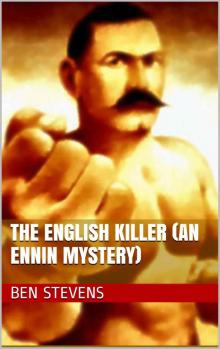 The English Killer (An Ennin Mystery) (The Ennin Mysteries Book 31)
The English Killer (An Ennin Mystery) (The Ennin Mysteries Book 31) The Ennin Mysteries: Collected Series 1 – 5 (25 Stories) MEGAPACK
The Ennin Mysteries: Collected Series 1 – 5 (25 Stories) MEGAPACK Tokyo Zombie Apocalypse
Tokyo Zombie Apocalypse The Strange Case of the Disappearing Dragon (An Ennin Mystery #32)
The Strange Case of the Disappearing Dragon (An Ennin Mystery #32) I, Hell
I, Hell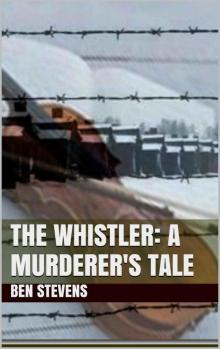 The Whistler: A Murderer's Tale
The Whistler: A Murderer's Tale Parker: The Story of an Apocalypse Survivor: COMPLETE SERIES
Parker: The Story of an Apocalypse Survivor: COMPLETE SERIES Confessions of a Japanese Temple Gardener: (P.S – Who's from London, England)
Confessions of a Japanese Temple Gardener: (P.S – Who's from London, England)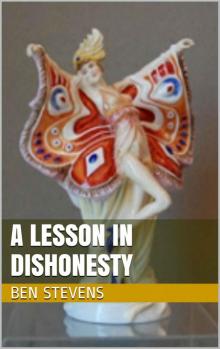 A Lesson in Dishonesty
A Lesson in Dishonesty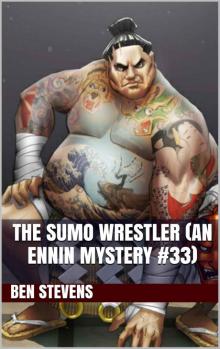 The Sumo Wrestler (An Ennin Mystery #33)
The Sumo Wrestler (An Ennin Mystery #33)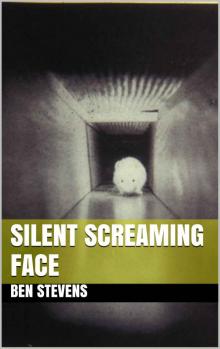 Silent Screaming Face
Silent Screaming Face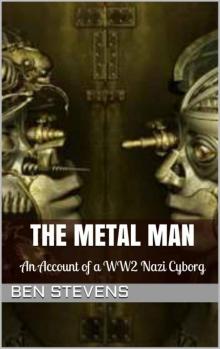 The Metal Man: An Account of a WW2 Nazi Cyborg
The Metal Man: An Account of a WW2 Nazi Cyborg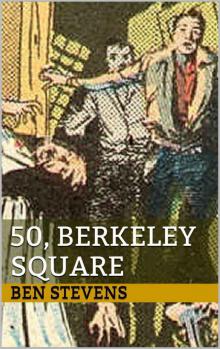 50, Berkeley Square
50, Berkeley Square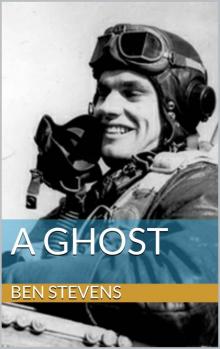 A Ghost
A Ghost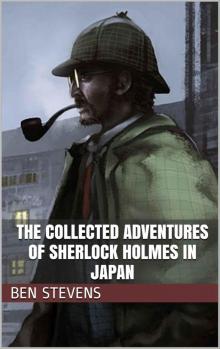 The Collected Adventures of Sherlock Holmes in Japan
The Collected Adventures of Sherlock Holmes in Japan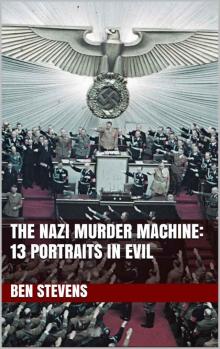 The Nazi Murder Machine: 13 Portraits in Evil
The Nazi Murder Machine: 13 Portraits in Evil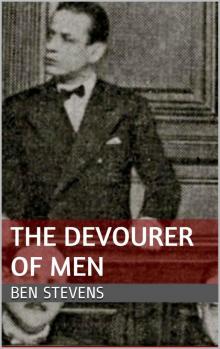 The Devourer of Men
The Devourer of Men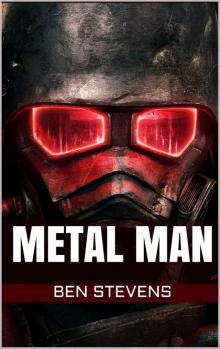 Metal Man
Metal Man The Egyptian Tomb Raider (An Ennin Mystery #34)
The Egyptian Tomb Raider (An Ennin Mystery #34)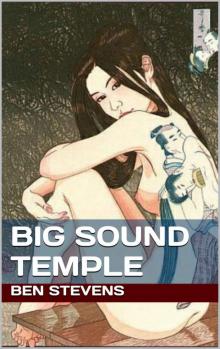 Big Sound Temple
Big Sound Temple The Ennin Mysteries: Collected Stories 26-30
The Ennin Mysteries: Collected Stories 26-30